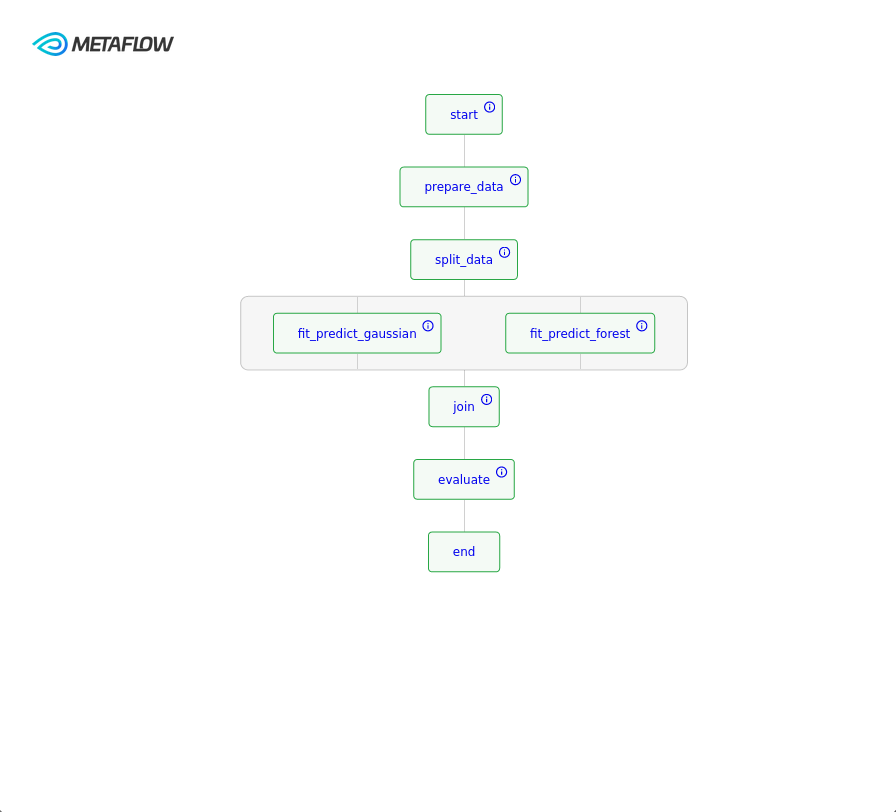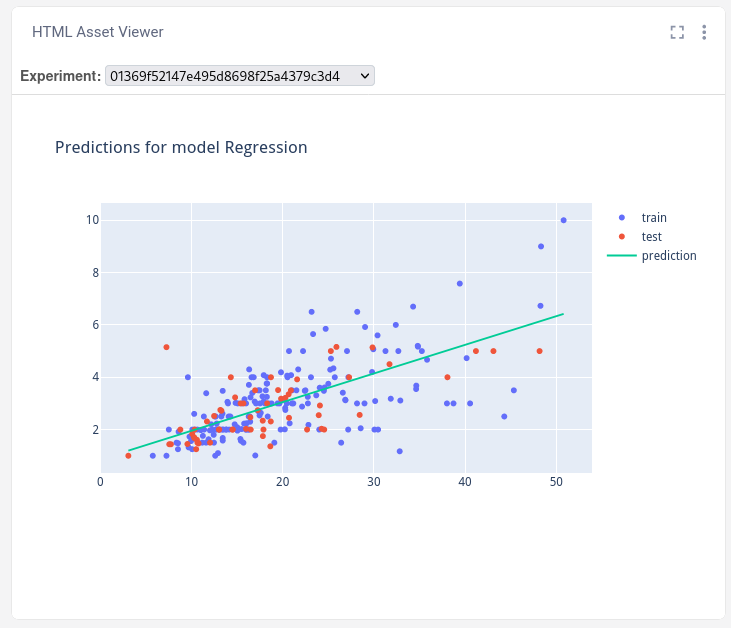Integrate with Metaflow¶
Metaflow is a human-friendly Python library that helps scientists and engineers build and manage real-life data science projects. Metaflow was originally developed at Netflix to boost productivity of data scientists who work on a wide variety of projects from classical statistics to state-of-the-art deep learning.
Start logging¶
- Import Metaflow integration with
from comet_ml.integration.metaflow import comet_flowat the top of your pipeline script. - Annotate your Flow class with the
@comet_flowdecorator.
from comet_ml.integration.metaflow import comet_flow
from metaflow import FlowSpec, step
@comet_flow
class HelloFlow(FlowSpec):
@step
def start(self):
self.next(self.end)
@step
def end(self):
pass
if __name__ == "__main__":
HelloFlow()
Visualize Metaflow runs¶
The Comet-Metaflow integration allows you to track both individual tasks and the state of the flow as a whole. The state of the flow can be visualized using the Metaflow Panel available in the Featured tab.
You can recreate the view above by:
- Grouping experiments by
metaflow_run_id. - Adding the Metaflow Flow panel available in the Featured tab. See here how to add a panel to your dashboard.
- Saving the view as a Metaflow dashboard.
The Metaflow Flow can be used to either visualize the latest state of the DAG or the static graph, similar to what is available in the Metaflow UI. In addition, all tasks that have been tracked in Comet can be directly accessed by clicking on each task.
Log automatically¶
The Comet Metaflow integration creates several Experiments, one for the run itself and one for each task.
Run Experiment¶
The Run Experiment logs the following information automatically:
| Item Name | Item Type | Description |
|---|---|---|
| {current_flow_name} - {current_run_id} -graph.json | Asset | The Metaflow Flow graph exported as JSON |
| comet_run_id | Other | The Metaflow unique Run ID |
| metaflow_branch_name | Other | Metaflow branch name |
| metaflow_flow_name | Other | The Metaflow Flow Name |
| metaflow_graph_file | Other | The name of the Comet Experiment Asset containing the Metaflow Flow graph |
| metaflow_is_production | Other | Metafow is production flag |
| metaflow_is_user_branch | Other | Metaflow is user branch flag |
| metaflow_project_flow_name | Other | Metaflow full project name |
| metaflow_project_name | Other | The user-provided Metaflow project name |
| metaflow_run_id | Other | The Metaflow unique Run ID |
| metaflow_status | Other | The status of the Metaflow Flow, can be Running, Completed or Failed |
| pipeline_type | Other | Internal field used to distinguish between integrations |
In addition, the run Experiment is tagged with run and all tags set on the flow itself. For more details on tagging, see Metaflow documentation.
Metaflow Parameters are saved as hyperparameters automatically.
You can access the Comet Experiment key for the current run, using self.run_comet_experiment_key. See the example below.
@step
def evaluate(self):
from comet_ml import API
from sklearn.metrics import accuracy_score
accuracy = accuracy_score(self.prediction, self.Y_test)
run_experiment = API().get_experiment_by_key(self.run_comet_experiment_key)
run_experiment.log_metric("Run accuracy", accuracy)
Task Experiment¶
By default, the Comet integration creates a Comet Experiment for each step. If a step is executed with a foreach loop, the Comet integration will create a Comet Experiment for each parallel execution of that step. See below how to skip creating a Comet Experiment for some of your steps.
All of those Comet Experiment will logs the following information automatically:
| Item name | Item type | Description |
|---|---|---|
| comet_run_id | Other | The Metaflow unique Run ID |
| comet_step_id | Other | The current Metaflow step ID |
| comet_task_id | Other | The current Metaflow task ID |
| metaflow_branch_name | Other | Metaflow branch name |
| metaflow_flow_name | Other | The Metaflow Flow Name |
| metaflow_is_production | Other | Metafow is production flag |
| metaflow_is_user_branch | Other | Metaflow is user branch flag |
| metaflow_origin_run_id | Other | Metaflow Run ID of the original run when a flow is resumed |
| metaflow_project_flow_name | Other | Metaflow full project name |
| metaflow_project_name | Other | The user-provided Metaflow project name |
| metaflow_run_experiment | Other | The Comet Experiment Id for the Run Experiment |
| metaflow_run_id | Other | The Metaflow unique Run ID |
| metaflow_status | Other | The status of the Metaflow step, can be Running, Completed or Failed |
| metaflow_step_name | Other | The name of the Metaflow step |
| metaflow-card-{step_name}-{card_number}.html | HTML Asset | Each metaflow card is logged as a separate HTML Asset |
| pipeline_type | Other | Internal field used to distinguish between integrations |
In addition, each task Experiment is tagged with task, with the step name and all tags sets on the flow itself. For more details on tagging, see Metaflow documentation.
Metaflow Parameters are saved as hyperparameters automatically.
You can access the Comet experiment inside each task using self.comet_experiment. See the example below.
@step
def fit(self):
# Import model
from sklearn.naive_bayes import GaussianNB
model = GaussianNB()
model.fit(self.X_train, self.Y_train)
self.prediction = model.predict(self.X_test)
self.comet_experiment.log_confusion_matrix(self.Y_test, self.prediction)
Metaflow Cards¶
The Metaflow integration automatically logs Metaflow cards for each Task. Metaflow cards are exported to HTML and are logged as assets to the corresponding Comet Experiment.
To visualize them, you can use the HTML Asset Viewer featured panel at both the single Experiment and project level.
End-to-end example¶
The following is a basic example of using Comet with Metaflow.
If you can't wait, check out the results of this example Metaflow project for a preview of what's to come.
Install dependencies¶
python -m pip install "comet_ml>=3.44.0" metaflow
Run the example¶
Run the following Metaflow example with: python helloworld.py run.
# coding: utf-8
from comet_ml import login
from comet_ml.integration.metaflow import comet_flow
from metaflow import FlowSpec, step
# Login to Comet if needed
login()
@comet_flow(project_name="comet-example-metaflow-hello-world")
class HelloFlow(FlowSpec):
"""
A flow where Metaflow prints 'Hi'.
Run this flow to validate that Metaflow is installed correctly.
"""
@step
def start(self):
"""
This is the 'start' step. All flows must have a step named 'start' that
is the first step in the flow.
"""
print("HelloFlow is starting.")
self.next(self.hello)
@step
def hello(self):
"""
A step for metaflow to introduce itself.
"""
print("Metaflow says: Hi!")
self.next(self.end)
@step
def end(self):
"""
This is the 'end' step. All flows must have an 'end' step, which is the
last step in the flow.
"""
print("HelloFlow is all done.")
if __name__ == "__main__":
HelloFlow()
Try it out!¶
Don't just take our word for it, try it out for yourself.
- For more examples using Metaflow, see our examples GitHub repository.
- Run the end-to-end example above in Colab:
Skip Metaflow steps¶
If your flow contains a lot of steps or a loop with a lot of iterations and the resulting experiments for those steps have no or little value, you can skip those steps. If a step is skipped, the Comet integration won't create a live Comet experiment.
To do that, apply the decorator @comet_ml.integration.metaflow.comet_skip to the Metaflow step you want to skip. Here is an example where the iteration step won't create 20 Comet experiments:
from comet_ml.integration.metaflow import comet_flow, comet_skip
@comet_flow(project_name="metaflow-loop-acceptance-test")
class LoopFlow(FlowSpec):
@step
def start(self):
self.values = list(range(20))
self.next(self.iteration, foreach="values")
@comet_skip
@step
def iteration(self):
print("Called with %d" % self.input)
self.double = self.input * 2
self.next(self.join)
@step
def join(self, inputs):
self.results = [input.double for input in inputs]
self.next(self.end)
@step
def end(self):
print('\n'.join([str(x) for x in self.results]))
Warning
When a step is skipped, a Comet experiment is still accessible through self.comet_experiment. Calls to logging methods (like self.comet_experiment.log_metrics) will continue to work but all data will be discarded.
Configure Comet for Metaflow¶
The comet_flow decorator can be called, either without any arguments or with the following arguments:
| Argument Name | Argument Type | Description |
|---|---|---|
| project_name | String | The Comet Project name to use. |
| workspace | String | The Comet Workspace name to use. |
experiment = comet_ml.Experiment(
log_graph=True, # Can be True or False.
auto_metric_logging=True # Can be True or False
)
Add or remove these fields from your .comet.config file under the [comet_auto_log] section to enable or disable logging.
[comet_auto_log]
graph=true # can be true or false
metrics=true # can be true or false
export COMET_AUTO_LOG_GRAPH=true # Can be true or false
export COMET_AUTO_LOG_METRICS=true # Can be true or false
For more details on the arguments, see Experiment.__init__.
These arguments will impact all Experiments created by the integration, the run Experiment and all of the task Experiments.

